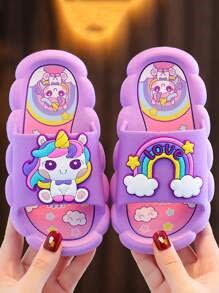
The Maltese government has put its foot down, ordering Shein and Temu to recall several pairs of children’s shoes.
Malta’s Competition and Consumer Affairs Authority (MCCAA) said Monday that upon testing children’s shoes and clothing purchased from Shein and Temu, it found that five of 10 items contained higher-than-legal levels of toxins.
More from Sourcing Journal
In Shein’s case, that included three pairs of children’s shoes: one pair of slide-on slippers, a pair of dinosaur rain boots and a pair of slide sandals. For Temu, the recall will affect two pairs of children’s shoes: cartoon slide sandals and a pair of shark-themed rain boots.

A pair of children’s slippers purchased from Shein. Photo courtesy of MCCAA press release.
The MCCAA said the items violated the European Union’s Registration, Evaluation, Authorization and Restriction of Chemicals (REACH) regulation, which is meant to better protect people and the environment from risks posed by chemicals.
The MCCAA’s Technical Regulations Division tested the five pairs of shoes, as well as other children’s clothing and shoes, at an accredited lab.
“It is to note that while no failures were detected for the clothing items, the same cannot be said for the footwear products as five out of the five slippers and rain boots tested were found to be non-compliant to the applicable regulation,” the organization wrote in a statement.
Malta has called on consumers who purchased any of the five products to immediately stop use, and has noted that the seller should directly contact them to arrange a refund.
A spokesperson for Temu said the company has already taken action on that.
“Temu takes product safety seriously. The two products in question have been recalled and affected customers have been notified,” the spokesperson said. The company did not comment on the specificities of its safety procedures.
In its seller services agreement, Temu stipulates that its merchants must “cooperate with all regulatory authorities’ inquiries and investigations about your products in a timely manner as required.” It also notes that its sellers are responsible for any recalls and that Temu can take products down, issue risk alerts to buyers, cancel orders, apply refunds and other measures.
South Korea has cracked down on Temu in recent weeks, citing that upon testing a children’s coat, Seoul Metropolitan Government authorities found that it contained 622 times the legal limit of toxins, despite the e-commerce company signing an agreement with the Korean Fair Trade Commission committing to increasing its safety protocols.
A Shein spokesperson declined to comment.
Earlier this year, the company faced similar scrutiny from the South Korean government, after it found that a pair of shoes sold on Shein contained 229 the country’s legal limit for phthalates.
At that time, a Shein spokesperson told Sourcing Journal said it “regularly [carries] out risk-based sampling tests to ensure that products provided by suppliers meet Shein’s product safety standards,” and noted that it had conducted more than 400,000 safety tests with third-party agencies in the past year.
Malta has a population of fewer than 500,000 people, according to the U.S. Central Intelligence Agency (CIA) World Factbook. That matters because, as Shein and Temu continue their expansion quests, Temu has attempted to set up shop in markets like Brunei, also home to fewer than 500,000 people; Indonesia and Vietnam. Shein has effectuated similar expansion plans. Though the latter two countries have larger populations than the former two, they are also less saturated e-commerce markets than the U.S., where Temu and Shein’s future hangs in the balance due to potential regulatory changes.
But Shein and Temu can’t seem to shake the regulatory scrutiny that continues to follow them around the globe; in Vietnam, the companies’ domains are currently suspended for lack of registration. In Indonesia, the government has effectively banned Temu. In South Africa, authorities have closed the de minimis loophole—which allowed low-priced e-commerce products from outside the country to enter without taxes and duties—partly in response to Shein and Temu’s impacts.
Malta follows in South Korea’s footsteps when it comes to product testing for toxic chemicals; for Shein and Temu, it’s just the latest in a slew of complaints and issues. The MCCAA did not immediately return Sourcing Journal’s request for comment on the products and testing.
